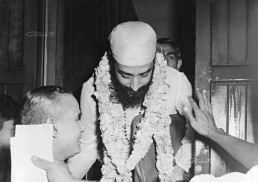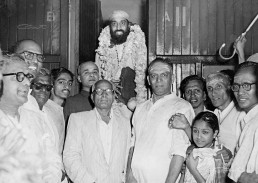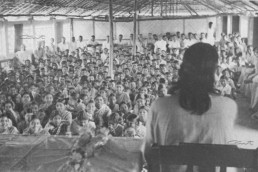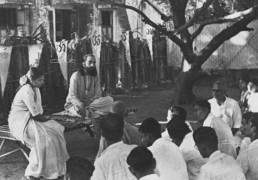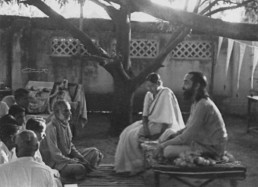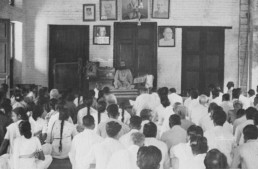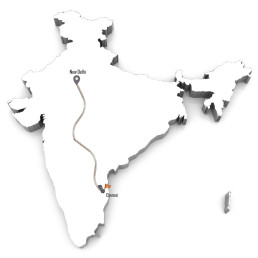
Jnana Yajna 8

Year & Dates:
December 16, 1954 to January 25, 1955

Yajna Topics:
Taittiriya Upanishad

Place:
Chennai, India.
It was an exhilarating, energetic unfoldment for 41 days in Thyagarayanagar, Chennai (Madras). The huge Pandal (enclosure) could not hold the teeming crowds; more than a thousand of the nearly 4000 people would stand for close to two hours engrossed in the inexpressible bliss of the melodic Taittiriya Upanishad. As Pujya Gurudev Swami Chinmayananda explained about the different kinds of Upasana in the first section of the Upanishad, the listeners were inspired. He also highlighted the ancient, convocation address of 25 key instructions given to students in Section 11 of Shikshavalli, pointing out that they were “Vedanta in Practice.” Those sacred commandments began with the teacher’s reminder, “Satyam Vada ” and pointed to how one can live a noble, integrated life.
Deeper Study, Increasing Crowds
Having prepared the audience to lift themselves to a higher vision of life, Pujya Gurudev guided them into the sublime, direct definition of Truth as “Satyam, Jnanam, Anantam.” Sharing the depth of the second section, “Brahmananda Valli,” He also challenged seekers to journey within and enquire intensely. Pujya Gurudev’s systematic, scientific analysis of the five sheaths (Panchakosa) within the human personality was gripping. The way He described the ascending scale of joy in the evolution toward the Absolute amazed the audience. The immortal discussion between Varuna, the Teacher, and Bhrigu, the Disciple outlining the steps to enquire and realize the Highest goal of life was embedded in the minds of the attentive audience. The thirst to realize that “The Source of all joy in the entire universe is but the Bliss of the Self ” was created in that momentous yajna. The earnest seekers who had already begun devoted study of the Upanishads after Pujya Gurudev’s second yajna in Chennai were further motivated to learn, analyze, and apply the scriptural teachings. The phenomenon called Chinmaya Study Groups would soon spread around the country and later the world.
In Admiration
Smt. Meenambal of Chennai vividly captures the transformative voyage guided by Pujya Gurudev Swamiji Chinmayananda, steering her weather-beaten vessel through life’s stormy ocean. “At first it was his learned exposition couched in the finest poetry that drew me to him. The fatigue of the day’s work or the distance that had to be walked or the rains could not stop me. I was drawn by some irresistible force, as it were. I felt I has at last landed on a sequestered harbour. What the temples, the Bhajans and the discourses failed to give me, the lucid explanations of the Upanishad by Chinmaya gave me. The mysteries of the grand universe, of which this little “I” forms a part, were slowly unravelled by my Guru, who, by his inimitable examples, made easy the most un-understandable portions of our Hindu philosophy.”
Photo Gallery
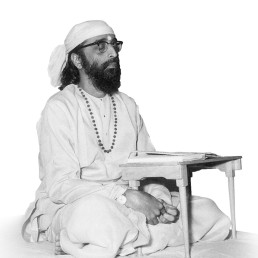
“Think,” Says Pujya Gurudev
All Upanishads start with a ‘peace invocation’, a prayer to the Cosmic Powers to ward off all obstacles on the path of study, and this prayer id daily chanted together by the teacher and the taught. A prayer is an invocation, and not a contract. Now-a-days, we are misusing this technique of prayer in our own ignorance and therefore we find that our Gods are deaf to our prayers. This is true today with all religions. The science of prayer explains, that when an individual surrenders himself-meaning, all his identifications with his body, mind and intellect-through devotion, reverence and understanding-love, he removes from himself all the causes for his limitations and what is thus left over is the Absolute perfection which is the essence of his very being. Thus, prayer is the active part of the divine action, while the final successful invocation is its fulfilment.
Taittiriya Upanishad Book, p. 8
In the definition of this bliss the scripture also gives us indirectly the conditions necessary for true material enjoyment. Wealth in itself is no joy unless the rich man is young enough. Mere youthfulness dissipates itself in wealth unless he is well-educated to live the healthy values of life. Mere knowledge and youthfulness cannot contribute to the enjoyment of the wealth unless he is well-disciplined and has developed sufficiently his willpower. One who has youthfulness, education, discipline, and power of self-control and self-assertion, if he is strong in body, mind and intellect, he alone is capable of enjoying wealth. To all others wealth is an added burden weighing down their shoulders. A donkey carrying golden bricks is in no way better and luckier than the donkey which is carrying mudbricks! The Prarabdha of the pigs cannot be improved because they are housed in Prime Minister’s own drawing-room.
Taittiriya Upanishad Vol. 1, No. 4 Yajna Prasad, p. 168
Curious About Fearless Wisdom?
Beyond ordinary joy lies the profound experience of Ananda Brahman. In this enlightening discourse from Taittiriya Upanishad, witness how the Vidvan, the true knower, conquers fears and transcends regrets, unveiling a life of eternal bliss. Dive into the culmination of the Upanishad with us, exploring the timeless wisdom that leads to self-realization. The excerpt presented here is an audio except from Taiittiriya Upanishad discourses given in Chennai, 1963.
